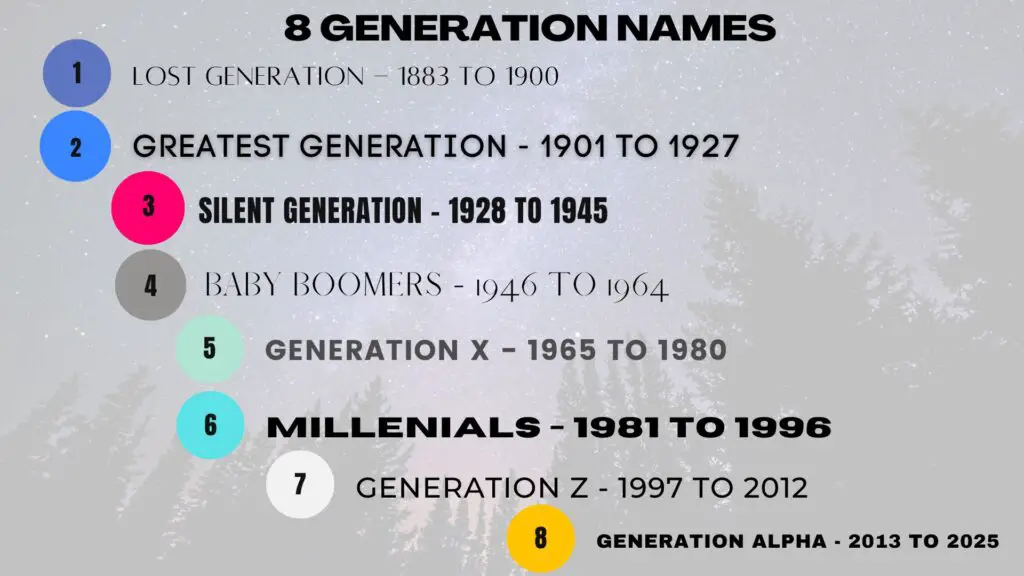
Throughout history, every generation has left its unique imprint on society. Each cohort, defined by the shared experiences and values of the individuals born within a specific time frame, has been given a name. Understanding these generation names and years helps us appreciate the evolution of societal values and the roles different generations play in shaping our world. In this article, we will delve into the most widely recognized generation names and their years, exploring the key characteristics and events that have shaped them.
The Lost Generation (1883-1900)
Born between 1883 and 1900, the Lost Generation earned its moniker from Gertrude Stein, who used the term to describe the disillusionment many felt following the trauma of World War I. Key literary figures, such as Ernest Hemingway and F. Scott Fitzgerald, belonged to this generation. The Lost Generation is often characterized by its members’ rejection of traditional values and a sense of moral and spiritual aimlessness.
The Greatest Generation (1901-1927)
The Greatest Generation, born between 1901 and 1927, was a cohort shaped by the Great Depression and World War II. Coined by journalist Tom Brokaw, this term pays tribute to the resilience and self-sacrifice of the generation who fought against totalitarianism and rebuilt the post-war world. The Greatest Generation is associated with strong work ethic, frugality, and a sense of civic duty.
The Silent Generation (1928-1945)
The Silent Generation refers to those born between 1928 and 1945, a period marked by the Great Depression and World War II. This generation is often characterized as being cautious, conformist, and risk-averse, having grown up in an era of economic uncertainty and global conflict. They are known for their loyalty to institutions and traditional values, often prioritizing stability and security.
Baby Boomers (1946-1964)
Born between 1946 and 1964, Baby Boomers witnessed a period of unprecedented economic growth and social change in the post-war era. As the name suggests, this generation was the result of a significant birth rate increase during the post-war years. Baby Boomers have been influential in shaping modern society and are often associated with optimism, ambition, and a focus on individualism. However, they are also criticized for their contribution to environmental degradation and wealth inequality.
Generation X (1965-1980)
Generation X, or Gen X, comprises individuals born between 1965 and 1980. This generation grew up during the Cold War, the rise of personal computing, and the early stages of the internet revolution. Gen X is often described as independent, resourceful, and pragmatic, shaped by their experience of economic downturns and the decline of traditional social structures. They are the first generation to prioritize work-life balance and are often credited with introducing the concept of the “latchkey kid.”
Millennials (1981-1996)
Millennials, also known as Generation Y, were born between 1981 and 1996. They have grown up in a world defined by rapid technological advancements, globalization, and the rise of the internet. As a result, they are often characterized as tech-savvy, open-minded, and socially conscious. However, they are also known for their struggles with student debt, job instability, and housing affordability.
Generation Z (1997-2012)
Generation Z, or Gen Z, encompasses individuals born between 1997 and 2012. As digital natives, they have never known a world without the internet and smartphones. Gen Z is often characterized as entrepreneurial, environmentally conscious, and highly diverse in terms of race and gender identity. They are also the first generation to grow up in a post-9/11 world, which has shaped their perspectives on global conflict and security.
Generation Alpha (2013-2025)
Generation Alpha, the youngest generation as of this article’s knowledge cutoff, includes individuals born between 2013 and 2025. Coined by Australian social researcher Mark McCrindle, the name “Alpha” signifies the beginning of a new generation cycle. As they grow older, it is anticipated that Gen Alpha will be the most technologically advanced, globally connected, and well-educated generation to date. While it is too early to define their characteristics, early research suggests they may be even more adept at navigating the digital world than their Gen Z predecessors.
Conclusion
In understanding generation names and years, we gain valuable insights into the cultural, social, and economic shifts that have shaped our society. Each generation is defined by the events and experiences that occur during their formative years, contributing to unique perspectives and values. By acknowledging these differences, we can foster a greater sense of empathy and collaboration between generations, ultimately building a more inclusive and progressive world.
Author

Alona Smith is a devoted follower of Jesus Christ who believes that life’s true purpose is found in knowing Him and making Him known. She is passionate about sharing God’s Word with clarity and compassion, helping others see the beauty of the gospel of grace revealed through the Apostle Paul.
Grounded in Scripture and led by the Spirit, Alona seeks to live out her faith in practical ways—showing kindness, extending forgiveness, and walking in love. Whether serving in her local church, encouraging a friend in need, or simply living as a light in her community, she strives to reflect Christ in both word and deed.
